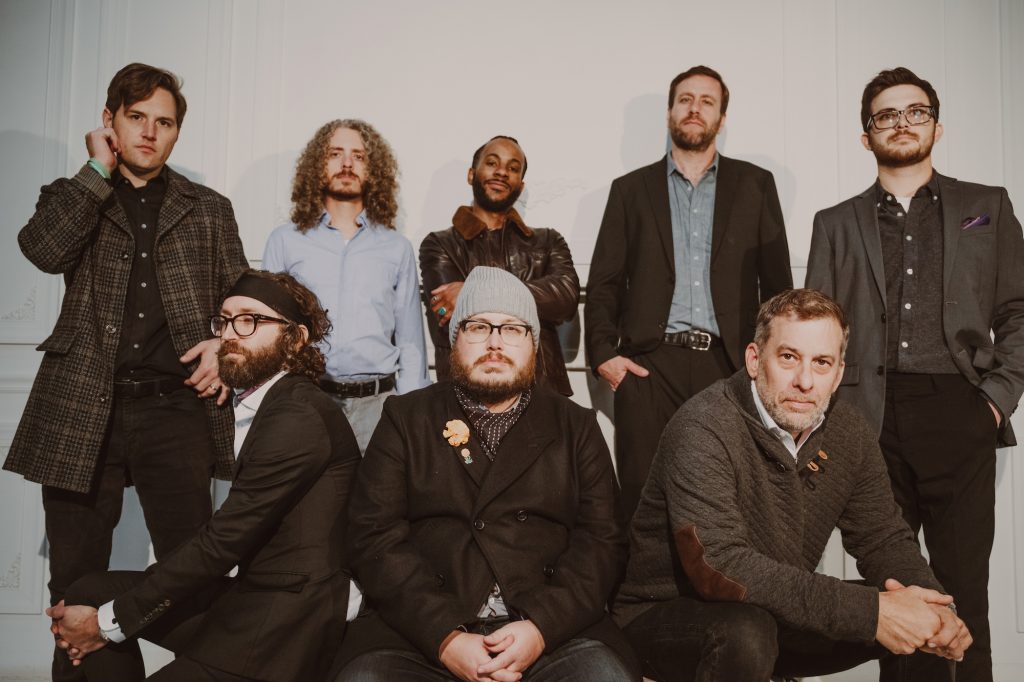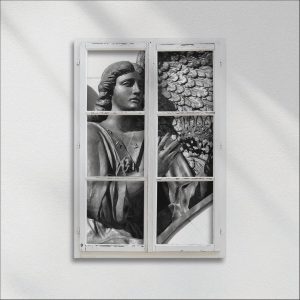In the Deep End With … St. Paul & The Broken Bones

Paul Janeway, co-founder and exuberant frontman of St. Paul & The Broken Bones, is talking over the birds. As he talks on the phone from his home in Birmingham, Alabama, the birds’ songs carry clearly over his own voice. He laughs if off, though, luxuriating in what he calls “the bird sanctuary” of his hometown and home state, away from the density and intensity of the country’s coastal music cities.
The last time No Depression checked in with St. Paul & The Broken Bones, they were on the verge of releasing their fourth studio album, The Alien Coast. In a photo essay for the Spring 2022 “General Admission” issue, Janeway wrote about the significance of recording at Communicating Vessels in the band’s hometown.
Just a month after the band finished recording The Alien Coast, Janeway reached out to bassist and band co-founder Jesse Phillips about getting right back to work. Janeway and his wife had learned that they were going to have a daughter, and he had already written another batch of letters to her that ultimately became songs.
Two weeks before Marigold was born, in September 2020, the band figured out a way to get to Memphis to record with Matt Ross-Spang at Sam Phillips Recording Studio. “I have to do this,” Janeway recalls thinking to himself. “Once she’s born this moment is over.”
Those resulting songs make up Angels in Science Fiction, which comes out on April 21 on ATO Records. Thematically deeply personal, the 12-track album reflects that vulnerability through its nuanced musicality as well. While maintaining some of the R&B and experimental sounds of previous records, Angels in Science Fiction also captures musical moments of quietude and subtlety. Drummer Kevin Leon sits in on piano on the opening “Chelsea,” and other songs like “Lonely Love Song” and “Heat Lightning” are fully acoustic numbers.
“It was somewhat minimalist, which is hard for a band like us because we have eight members,” says Janeway with a laugh. “We got to kind of write the record that way due to circumstances, really, and then it just fit the record.”
A few weeks before Angels in Science Fiction’s release, No Depression checked in with Janeway to talk about the new record and more. In keeping with the style of this “In the Deep End with ….” series, questions start easy and get progressively more thoughtful. Responses have been edited for length and clarity.
First of all, congratulations are in order! How’s #dadlife treating you?
It’s all the cliches it could possibly be. It’s wonderful and horrible. Every moment you’re like, “Oh God, I’m at my wit’s end!” and then there’s a smile or a funny thing it just melts everything away. It is a wonderful thing. It’s been it’s been a really interesting journey and she’s two and a half now.
All of the songs on Angels In Science Fiction began as letters to your daughter, so the story goes. What was your process of writing those?
I always kind of call it “divine inspiration” because typically, it takes me a while to write a song. It takes me a month, months, or it could take a year. With these, it took about three hours for all of them. I think part of it was just I had so much in me from a creative standpoint that I had to get it out. That’s the first time that’s happened probably since Half the City. But with Half the City, it was more out of necessity because we had no money and we didn’t have any time. It’s funny, a lot of it is for my daughter, but I think the record is probably more about me than anything else — my reservations, or my fears, or my joy, or predicting what’s going to happen.
Those personal themes are definitely apparent, as well as ideas of seemingly grappling with God, faith, and the meaning of life. But it also seems like place was important here, like on songs like “Wolf in Rabbit’s Clothes” (New York City), “Oporto-Madrid Blvd.” (a real thoroughfare in Birmingham), and “South Dakota,” for example.
All of the songs are kind of written the scenes in mind. This is gonna be a nerdy thing, but I thought of it like the Horcruxes of Voldemort. So whether it be a place, or a thing, or something like that, each song has [a scene].
The first song is called “Chelsea.” That’s where I’m from. That’s where I was born. It’s the beginning of the record; it was the beginning of me. And “South Dakota” [came from] Jesse — our bass player and co-founder of the band. His family’s affiliation is with the Tobacco Plains Band of the Kootenai Nation in Southeastern British Columbia, and he was telling me stories about buffaloes being pushed off a cliff. It was kind of insane! So me and my wife, during COVID, took one of those trips where we tried to avoid people, and ended up going to South Dakota and into the Badlands [home to the Lakota people]. It was our last trip before she was born, and so there’s kind of this moment of peace.
All of these songs are little more like that. Typically, when I write, it’s a little more coy, kind of “wink, wink,” and with multiple meanings, but this one’s a little bit more straightforward. All of them have places and I can tell you exactly where I was when I wrote it. I really liked the concept of it.
‘Angels In Science Fiction’ is due out April 21 via ATO Records
How did the album title Angels In Science Fiction come about? Which came first, the song or the album title?
The song came first because the lyrics were there. The song title is funny because originally called “Angels and Science Fiction.” I talked to my wife and she was like, “No, ‘Angels in Science Fiction.’” I was explaining to her this idea of fate and what’s real and what’s not, this kind of crisis of faith. Because when you have these moments, you do kind of go back to what you know. I think when I held [Marigold] it was the first time I prayed in probably a decade.
Well, and that’s such a huge part of your own story, and the band’s early story — your youth and religious upbringing, finding yourself, and your sound growing from that.
One hundred percent. It’s so funny because that’s part of your story whether you want it or not. I think as I’ve gotten older and with time, [I’ve accepted] it is an interesting part and it’s something that’s always going to find its way. I’ve given into that [faith, and crises of it] is gonna find its way whether it be in the music, the lyrics, the story, and I think at this point I’m okay with it because that is a part of it. There’s just no two ways about it.
These songs were written in 2020, but for us listeners, they’re brand new! For you, though, how have you connected with these “letters” years later, now that Marigold is pushing 3 years old?
It’s an emotional record. And because we released records so close together, we’re not really doing the Angels in Science Fiction tour until fall, which is going to be a theater tour. The songs pull out a lot of emotions within me, so I’m a little concerned, like, am I gonna be able to get through them? There are some sweet moments and there are some where I was guessing what I would feel like and I was kind of right!
Like, does it hit me the same way? It still hits me pretty hard. And what’s fun — and we were smart about this — we didn’t learn how to play the songs until this year. That part has been fun, so it does start to feel new when you’re relearning songs.
Give us an example of a song that you were guessing how you would feel and were exactly right. And conversely, what’s an example of a song that ended up being absolutely wrong, emotionally?
There’s definitely one song that’s questionable, and that would be “Heat Lightning.” The theme of it is, what if your daughter became a murderer?
[Laughter]
But it’s a fear when you’re having a child! I’d read Philip Roth’s American Pastoral. It’s about the death of the “American Dream” and all of this stuff and I was not in the best headspace. So I wrote the song. And I love that song! But it’s the most frustrating song out of all of them because of the harmony — it went from a minor to a major key.
“Marigold,” which is the last song, it fits. It’s spot on. Most of the record is pretty spot on! The only one was “Heat Lightning,” where I was like, “Phew! That’s a little weird territory!”
St. Paul & The Broken Bones is an interesting band these days because your sound is not necessarily as “rootsy” as it maybe once was, but you’re still seemingly very integrated in this scene and community. So in the broadest sense, what does roots music mean to you these days?
We’ve been very fortunate. We can play a jazz festival, we can play an Americana festival, we can play a rock festival. I’m never going to shit on any audience that wants to accept us!
For me, it’s just roots in American music. My definition of that is everything — from jazz to country to hip-hop. I leave the genres to PR people and record stores. That’s not something I get too preoccupied with. We make music we want to make. Whatever audience finds it, I have zero issues with as long as they understand that we’re going to go where we want to go.
I think it’s pretty funny if an album like The Alien Coast is classified as something rootsy, but if it finds a home there, then it finds a home there! And to be fair, I think this record, Angels in Science Fiction, is definitely more in that realm. I would say it’s the closest thing we’ve ever made to a folk record. And it’s as close as we’re ever going to get!